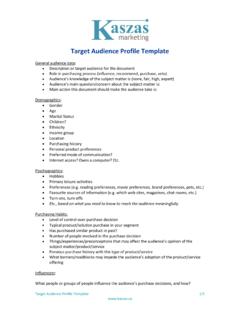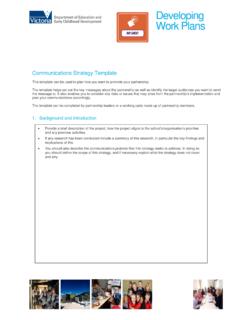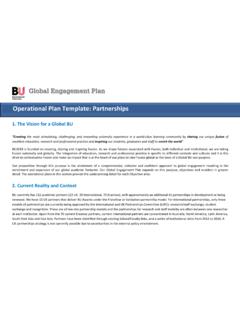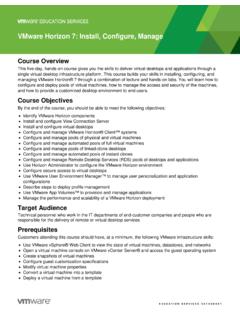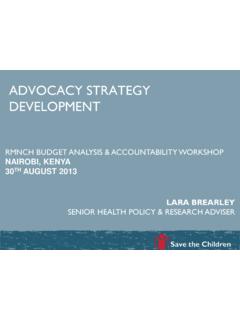Transcription of Table of Contents - mentorsme.co.uk
1 Table of Contents 1. Overview ..3. 2. The quick guide ..4. 3. Setting the scene ..5. 4. Developing the event ..6. 5. Registration of delegates ..7. 6. Marketing your event ..8. 7. The event itself ..9. 8. Post event activities ..12. 9. Contacting SFEDI ..13. Appendix 1 - Registration of delegates (sample questions) .. 14. Appendix 2 - Communications prior to the event (sample emails) .. 15. Appendix 3 - The welcome presentation (template) .. 16. Appendix 4 - mentoring record sheet (example).. 17. Appendix 5 - Table plan (sample) .. 18. Appendix 6 - Feedback questionnaire (template) .. 19. 2. 1. Overview About this guide This speed mentoring Event toolkit , developed by the Small Firms Enterprise Development Initiative (SFEDI), aims to provide an 'off the shelf' guide for organisations that would like to run a speed mentoring event to connect mentors and businesses.
2 It provides a generic format for a speed mentoring event, associated communications, and some ideas for additional activities to support the event. It starts with a quick guide to give you an overview of what's involved and then goes into much more detail about the considerations for each element of the event. SFEDI has developed this guide to encourage more organisations across the UK and beyond to deliver mentoring events and similar activities. If you benefit from the information we've provided here we would love it if you gave us a small credit in your event communications. Also, it would be fantastic if you helped us build on this guide by letting us know how the event went for your organisation and, of course, we'll credit you in this guide too. The SFEDI Group of companies deliver enterprise learning, qualifications and projects across the UK, please get in touch if you'd like to discuss any ways we can collaborate or support your enterprise activities.
3 We wish you every success with your speed mentoring event. How this guide came about Throughout February and March 2013, SFEDI worked in collaboration with the British Bankers' Association (BBA) to run a series of Meet A Mentor events across England to bring together volunteer mentors, that had completed the Government funded 'Introduction to Enterprise mentoring ' training as part of the Get mentoring scheme, with businesses looking for a mentor. The objective was to bring together 50 mentors and 50 mentees at each event and create an opportunity for each delegate to meet at least five connections that could lead to future mentoring relationships. As well as the benefit of creating connections, running the events also provided an opportunity to raise the profile of mentoring and encourage all businesses that became aware of the events to consider sourcing a mentor.
4 There was an extremely strong demand for the events from mentors and businesses looking for mentors and therefore an event could generate a great of interest amongst your business community. To tap into existing networks and generate a similar level of interest see the Identifying partners and sources of support' section. The benefits of speed mentoring An enterprise mentor supports a new or existing business owner as they develop themselves and their business. Excellent mentoring relationships are a two way relationship built on trust - with both parties learning new things from the other. mentoring relationships develop in many ways. Some evolve over time, such as an employer turning into a mentor as the employee leaves to set up their own business. Others may be the result of a chance meeting at a networking event where they find a common interest in each other's business objectives.
5 Other relationships may be the result of a detailed matching process organised by a formal mentoring scheme which often take into account background, future aspirations and personality. A speed mentoring event could potentially support all of these approaches. It could kick start connections that build over time, create chance meetings which lead to mentoring relationships very soon afterwards, and for formal schemes speed up the resource intensive matching process by enabling mentors and businesses meet many potential matches in a short period of time. A short meeting can often be enough time for people to decide whether there is enough of a connection to take the conversation further. For organisations new to mentoring , organising a speed mentoring event can also help the team gain a better insight into the mentors and businesses interested in mentoring in its community, and for all organisations, the process of promoting the event can raise the profile of wider mentoring and business support services.
6 3. 2. The quick guide There are lots of ways to approach the organisation of a speed mentoring event, and this toolkit provides details on the options open to you along the way. Before getting start, here's a quick guide on the key steps to go through. STEP 1: Decide on the objectives (these may include): a. To support the development of a target number of mentoring relationships b. To promote the benefits of mentoring c. To understand more about businesses engaged in mentoring in your region/sector STEP 2: Select a target audience: d. recruit appropriate mentors e. enlist potential mentees f. identify partners and collaborators to support the event STEP 3: Plan event structure: a. set time and date b. establish a venue c. arrange for refreshments STEP 4: Invite the mentors and mentees: a. Upload event invite onto your own website or Eventbrite b.
7 Create an online registration form or a single point of contact for registrations c. Email potential delegates to promote the event d. Email partners to ask them to promote the event e. Send confirmations and a reminder to registered delegates one week and a couple of days before the event and ask them to let you know if they can no longer attend. STEP 5: Develop the event format a. A welcome and introduction to mentoring b. An explanation of the process, objectives and outcomes c. The speed mentoring d. Informal networking e. Optional extras to support connections STEP 6: Event preparation a. Print delegate sheets with allocated name, number and description b. Print badges with name, number and mentor/mentee signifier c. Decide what additional materials and resources to provide. STEP 7: Gather feedback and evaluate the event a. Decide what you want to assess and how you will measure connections made b.
8 Send out a post-event survey a. Use results to modify future speed mentoring events and measure return on investment. 4. 3. Setting the scene Before embarking on the organisation of a speed mentoring event, answering the following questions can help shape the type of event you run. What are the main event objectives? Considering the objectives up front will influence the style of the event, the resource required, the expectation of delegates, and the possible outcomes. The objectives below for instance change the style of the event staged. Objective May result in an event which is: To raise awareness of the An informal, speed mentoring session, which gets budding mentors and businesses benefits of mentoring and together. Some relationships may develop as a result, however the priority is for your organisation's support people to learn more about mentoring , learn more about your organisation and to for businesses make some useful connections.
9 To create a high number of A more formal business event with 'added value' activities designed to encourage mentoring relationships matches. This might include detailed data capture on delegates at sign up, seating plans clustering people together with shared interests and follow on support for those that didn't find a match. These approaches are clearly at opposite ends of the scale and your event might have elements of both. Hopefully this document provides a mix and match approach so that you can design an event to suit your objectives. Who is the event for? The event might be for a general business audience, or it might focus on a specific sector or demographic. Focusing the event may increase a likelihood of mentoring relationships as there may be more chance for commonality and/or meeting expectations, however it could also reduce the size of the audience interested in signing up.
10 Ways to narrow the delegate criteria might include: Mentees Mentors Business sector Sector knowledge Business challenges ( exporting, marketing, growth) Area of expertise ( exporting, marketing, growth). Stage of business ( pre start, growing) Stage of business they prefer to support. Geographical location Geographical location Knowledge of mentoring / readiness to be mentored Level of mentor training / experience of mentoring Whether they are looking for volunteer or paid for Whether they are a volunteer or a paid mentor mentoring Even if the event is open to all, it could be that some of these are built into questions at sign up to help bring together people with common interests on the day. How much time will you need to recruit for the event? If you have an existing bank of mentors and a community of businesses to promote the event to, at least 6 weeks' notice is usually enough to secure diary time.

